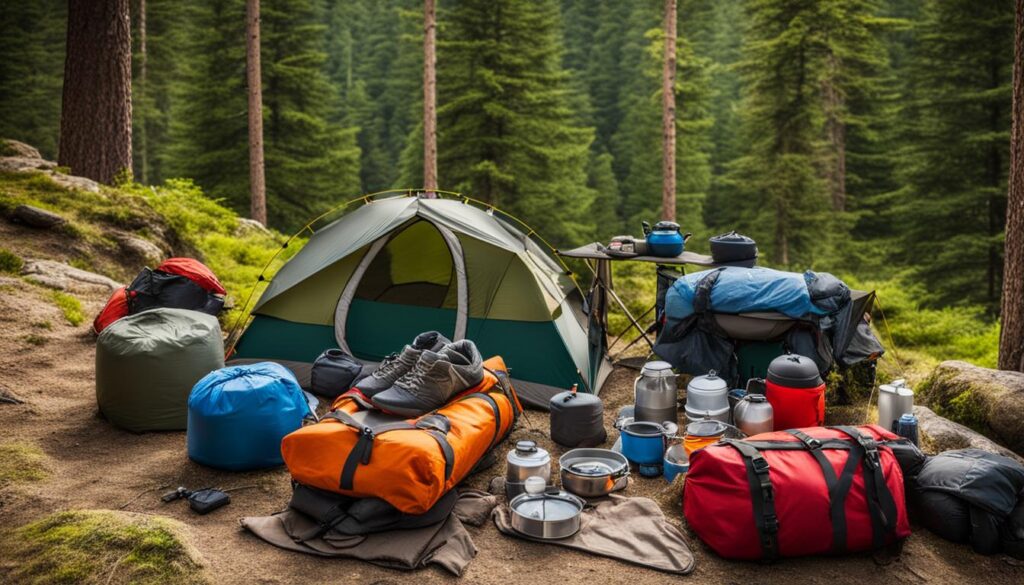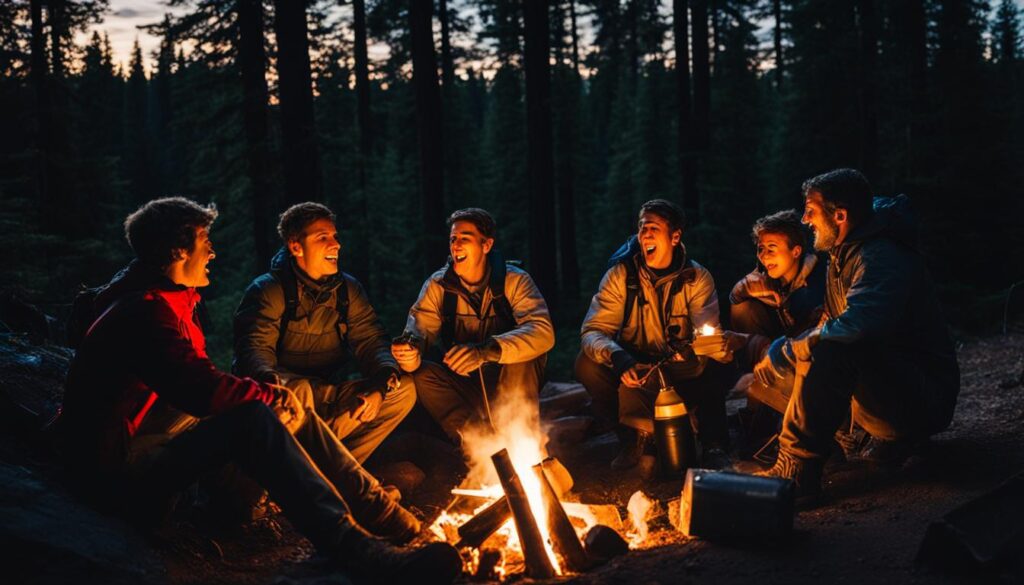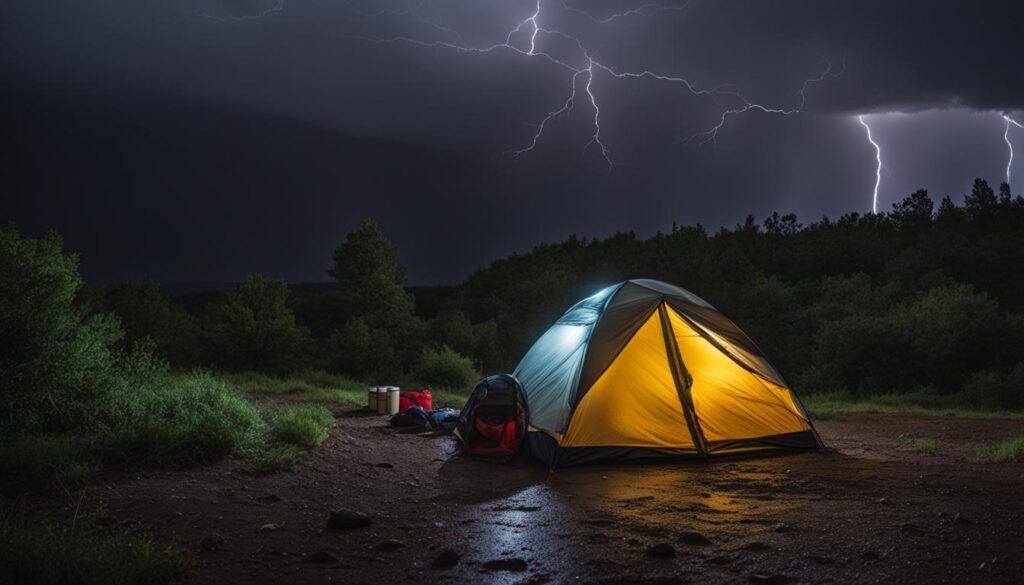Camping can be an exciting and rewarding experience, but it’s important to be prepared. To ensure a safe and enjoyable outdoor adventure, it’s essential to have camping survival tips, camping essentials, and camping safety in mind. These tips cover everything from choosing the right gear to staying safe in different weather conditions. By following these tips, you can make your camping trip a success.
Key Takeaways:
- Plan your camping trip carefully and create a camping checklist to ensure you have all the necessary items.
- Choose high-quality gear that is suitable for the camping conditions and consider using camping hacks to enhance your experience.
- Prioritize camping safety by being aware of your surroundings, storing food securely, and practicing basic first aid techniques.
- Be prepared for different weather conditions by selecting appropriate gear and clothing.
- Enjoy delicious meals while camping by planning your meals ahead of time and following proper food safety guidelines.
Planning Your Camping Trip
Before embarking on your camping adventure, it’s crucial to plan ahead and ensure a smooth and enjoyable experience. By creating a comprehensive camping checklist and considering the activities you want to engage in, you can make the most of your time in the great outdoors. Researching the campground or area you’ll be visiting will also help you understand any specific rules or regulations you need to follow, ensuring a safe and respectful experience.
Create a Camping Checklist
To ensure you have all the necessary essentials for your camping trip, it’s essential to create a detailed camping checklist. This will help you organize your gear and make sure you don’t forget any crucial items. Some items you may want to include in your camping checklist are:
- Tent
- Sleeping bag
- Camping stove
- Cookware and utensils
- Food and water
- Clothing and footwear
- First aid kit
- Outdoor activities gear (e.g., fishing rod, hiking boots)
- Toiletries and personal hygiene products
Consider Camping Activities
When planning your camping trip, think about the activities you want to participate in. Are you interested in hiking through nature trails, fishing in nearby lakes, or simply enjoying the tranquility of nature? By identifying the activities you’d like to engage in, you can pack the necessary gear and plan your itinerary accordingly.
Research the Campground or Area
Before heading out, take the time to research the campground or area where you’ll be camping. Find out if there are any specific rules or regulations you need to follow, such as fire restrictions or camping permits. Understanding the area’s amenities, facilities, and natural features will help you better prepare and enhance your camping experience.
Planning your camping trip in advance will not only ensure you have all the necessary gear and equipment, but it will also allow you to tailor your experience to your preferences. With a well-planned itinerary and a fully stocked camping checklist, you’ll be ready for an unforgettable adventure in the great outdoors.
Choosing the Right Gear
The right gear is essential for a successful camping trip. Investing in high-quality camping gear will ensure that you are well-prepared for any outdoor adventure.
Choosing the Perfect Camping Tent
A camping tent is one of the most important pieces of gear you’ll need. Look for a tent that is not only spacious and comfortable but also waterproof and sturdy. This will protect you from the elements and keep you dry even during heavy rain or strong winds.
| Features to Consider | Benefits |
|---|---|
| Waterproof material | Keeps you dry during rainstorms |
| Durable construction | Withstands strong winds and rough terrain |
| Easy setup | Saves time and minimizes hassle |
| Spacious interior | Allows for comfortable sleeping and storage |
Remember to also consider the size of the tent, as you’ll want to make sure it can accommodate all campers and their gear. Look for extra features, such as mesh ventilation panels, to keep the tent well-ventilated and free from condensation.
Camping Hacks for Maximum Comfort
Make your camping experience more comfortable and convenient with these camping hacks:
- Use solar lights near your tent stakes for better visibility at night.
- Reinforce your tent stakes in soft ground by placing rocks or heavy objects around them.
- Pack spare clothes and blankets in a sturdy, waterproof container to stay warm and dry.

Additionally, make sure you have the necessary camping gear to enhance your outdoor experience. Some essential items to consider include:
- A camp stove for cooking meals
- A headlamp for convenient hands-free lighting
- Camping chairs for comfortable seating around the campsite
Having the right gear not only ensures your comfort but also contributes to your safety and enjoyment while camping. With a well-chosen camping tent and clever hacks, you’ll be well-equipped for any camping adventure.
Camping Safety Basics
Safety should always be the top priority when camping. Whether you’re an experienced camper or a beginner, it’s essential to follow safety guidelines and be well-prepared to ensure a safe and enjoyable trip. Here are some camping safety basics to keep in mind:
1. Be Aware of Your Surroundings
When you arrive at your campsite, take a moment to familiarize yourself with the surroundings. Identify potential hazards like uneven terrain, low-hanging branches, or rocky areas. Keep a safe distance from wildlife and avoid approaching or feeding them. Remember, observing wildlife from a distance is the best way to appreciate their beauty while keeping both you and them safe.
2. Securely Store Food
Properly storing food is crucial to prevent attracting animals to your campsite. Keep all food in sealed containers or coolers and store them in a secure location, such as a bear-resistant food storage container or a designated food locker. Dispose of food waste properly to minimize the risk of attracting wildlife.
3. Follow Fire Safety Guidelines
If you plan to cook over a campfire, ensure you follow fire safety guidelines. Choose a suitable location for your fire, away from flammable materials and overhanging branches. Always have a bucket of water or a fire extinguisher nearby. Never leave the fire unattended, and make sure it is completely extinguished before leaving the campsite or going to sleep.
4. Supervise Children Around the Fire
If you’re camping with children, always supervise them around the campfire. Teach them essential fire safety rules, such as not playing too close to the fire and never playing with matches or lighters. Establish clear boundaries and ensure they understand the potential dangers of fire.
5. Pack a Well-Stocked First Aid Kit
A first aid kit is an essential item for every camping trip. Make sure yours is well-stocked with bandages, antiseptic ointment, pain relievers, insect repellent, sunscreen, and any necessary prescription medications. Familiarize yourself with basic first aid techniques to handle minor injuries or unexpected situations.
6. Know the Rules and Regulations
Before embarking on your camping adventure, familiarize yourself with the rules and regulations of the campground or area where you’ll be staying. Understand any restrictions on campfires, hiking trails, fishing, or specific activities. By knowing and respecting the rules, you can help protect the environment and ensure an enjoyable experience for everyone.

Incorporating these camping safety basics into your trip will help minimize risks and ensure a safe and memorable outdoor experience for you and your fellow campers. Stay informed, be prepared, and enjoy your time in the great outdoors!
Surviving Different Weather Conditions
Weather conditions can change rapidly when camping, so it’s important to be prepared. Whether you’re camping in hot weather, rainy conditions, or windy environments, having the right gear and knowledge is essential for your camping safety and comfort.
Camping in Hot Weather
If you’re camping in hot weather, it’s crucial to choose a tent with good ventilation to avoid overheating. Consider using a cooling mat to sleep on, which can help regulate your body temperature during warm nights. When setting up your tent, look for a shaded area to pitch it, as this will provide some relief from the sun’s heat. Additionally, using a reflective tent cover can help reflect sunlight and keep the interior cooler.
Camping in Rainy Conditions
When camping in rainy conditions, ensuring your tent is waterproof is vital. Look for a tent with a rainfly, sealed seams, and a bathtub-style floor to keep water out. To provide extra protection, consider using a tarp over your tent, creating an additional barrier against rain. When setting up your tent, choose higher ground to avoid potential flooding.
Camping in Windy Conditions
When camping in windy conditions, selecting a tent with extra stability features is crucial. Look for tents with sturdy poles, robust guylines, and quality stakes to withstand strong winds. When setting up your tent, pitch it with the lowest side facing the wind, which can help reduce the impact of gusts. Ensure that all guylines and stakes are securely fastened to keep your tent stable.
Camping in Cold Weather
If you plan on camping in cold weather, packing appropriate clothing layers and gear is essential. Dress in layers to trap insulating air and keep yourself warm. Bring thermal underwear, fleece jackets, insulated pants, and a warm sleeping bag to combat chilly temperatures. Additionally, consider using a tent with a snow skirt or snow flaps to prevent drafts.
Here is a table summarizing the camping essentials for different weather conditions:
| Weather Conditions | Camping Essentials |
|---|---|
| Hot Weather | Ventilated tent, cooling mat, shaded campsite, reflective tent cover |
| Rainy Conditions | Waterproof tent, rainfly, tarp, higher ground campsite |
| Windy Conditions | Sturdy tent with stability features, guylines, stakes, wind-facing setup |
| Cold Weather | Layered clothing, thermal underwear, fleece jackets, insulated pants, warm sleeping bag, snow skirt |
By being prepared for different weather conditions, you can have a safe and enjoyable camping trip. Remember to check the weather forecast before your camping adventure and adjust your gear and plans accordingly.

Camp Cooking Tips
Cooking while camping can be a fun and delicious experience. With some planning and the right gear, you can enjoy delicious meals that will fuel your outdoor adventures. Here are some camp cooking tips to help elevate your camping food ideas and make your camping trip even more enjoyable.
1. Plan Ahead
Before embarking on your camping trip, take some time to plan your meals. Choose camping food ideas that are easy to prepare and pack non-perishable food items to minimize the need for refrigeration. This will make it easier to pack and ensure that you have enough food for the duration of your trip.
2. Bring the Right Gear
Having the right camping gear is crucial for cooking delicious meals while camping. Some essential items to consider include:
- A camp stove: This will provide a reliable heat source for cooking your meals.
- Cookware: Pack pots, pans, and utensils that are suitable for outdoor cooking.
- A cooler: This will help keep perishable items fresh, allowing you to enjoy meals like sandwiches and salads.
3. Cook over a Campfire
One of the joys of camping is cooking over an open fire. It adds a unique flavor and sense of adventure to your meals. Consider investing in a campfire grill or grill grate to make cooking over the fire easier and safer. Just be sure to follow proper fire safety guidelines and check if campfires are allowed in the area where you’ll be camping.
4. Pack Utensils, Plates, and Cups
Don’t forget to pack the necessary utensils, plates, and cups for cooking and eating. Lightweight and durable options, such as reusable camping utensil sets and enamel plates, are great choices for camping. These items will make meal preparation and dining more convenient and enjoyable.
5. Follow Food Safety Guidelines
When camping, it’s important to follow food safety guidelines to prevent foodborne illnesses. Here are some tips to ensure food safety:
- Store perishable items in a cool box or cooler with ice blocks.
- Use frozen water bottles as ice blocks to keep food cold and ensure hydration.
- Wash your hands with soap and water or use hand sanitizer before handling food.
| Food Safety Guidelines | Benefits |
|---|---|
| Store perishable items in a cool box or cooler with ice blocks. | Prevents food spoilage and reduces the risk of foodborne illnesses. |
| Use frozen water bottles as ice blocks to keep food cold and ensure hydration. | Saves space in the cooler and provides a refreshing drink as the ice melts. |
| Wash your hands with soap and water or use hand sanitizer before handling food. | Reduces the spread of bacteria and prevents food contamination. |
By following these camp cooking tips, you can create delicious and satisfying meals while camping. Whether you’re cooking over a campfire or using a camp stove, the right gear and proper food safety practices will ensure a memorable outdoor dining experience. So pack your camping gear, plan your meals, and get ready to enjoy some tasty camping food!
Staying Clean in the Outdoors
Maintaining hygiene while camping is crucial for your health and well-being. To ensure cleanliness, pack essential camping essentials like biodegradable soap and toilet paper. These items will come in handy for cleaning and maintaining sanitary conditions during your outdoor adventure.
Another important aspect of hygiene is proper handwashing. Use hand sanitizer or wash your hands with soap and water before handling food and after using the restroom. This simple practice can help prevent the spread of germs and keep you healthy throughout your camping trip.
When it comes to waste disposal, follow the “leave no trace” principle. Dispose of waste properly and responsibly. Carry trash bags to collect all your waste and dispose of it in designated trash bins or recycling stations. Keeping our camping environment clean not only ensures our safety but also preserves the natural beauty of the great outdoors.
While shower facilities may not be available, there are alternatives to stay fresh and clean. Consider packing body wipes or taking a refreshing dip in a nearby lake or river. These options will help you maintain personal hygiene and stay comfortable during your camping experience.
FAQ
How can I plan my camping trip effectively?
Create a camping checklist, research the campground, and consider the activities you want to do while camping.
What are some essential camping gear items?
Invest in a high-quality camping tent, pack a camp stove, headlamp, and camping chairs.
What are some important safety tips for camping?
Be aware of your surroundings, store food securely, and follow safety guidelines for cooking over a campfire.
How can I prepare for different weather conditions while camping?
Choose a tent with good ventilation for hot weather, ensure your tent is waterproof for rainy conditions, and pack appropriate clothing for cold weather.
What are some camp cooking tips?
Plan your meals ahead, pack non-perishable food, bring a camp stove and cookware, and follow proper food safety guidelines.
How can I maintain hygiene while camping?
Pack biodegradable soap and toilet paper, use hand sanitizer or wash hands with soap and water, and dispose of waste properly.

